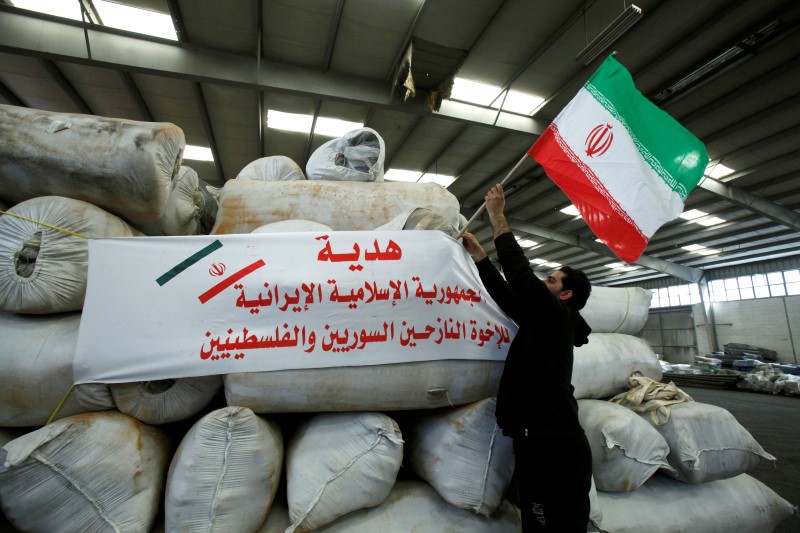By Suleiman Al-Khalidi
AMMAN (Reuters) - Syrian businessmen and trade officials say they are worried the economic lifeline provided by Iran is under strain from plunging oil prices, despite public messages of support from Syria's strongest regional ally.
Syrian President Bashar al-Assad has relied on oil-producing Iran to help him fight insurgents in a nearly four-year-old civil war and also prop up a currency under pressure.
"If it had not been for Iranian support we could not have survived the crisis," a senior Syrian trade official said from Damascus, requesting anonymity.
"It was Iranian support that has been the most important. In return, we are promising them more and more, and opening more and more doors for them to invest in Syria."
Oil production in Syria, which is under U.S. and European sanctions, has dropped sharply since the start of the conflict and as insurgents have taken over energy installations.
In July last year, Iran granted Syria a $3.6 billion credit facility to buy oil products, according to officials and bankers at the time. Another $1 billion went for non-oil products.
But with the global oil price down 50 percent since June, Syria - where rebels have seized up to a third of the country - has sought reassurances Tehran will maintain the status quo.
The public message has been an overwhelming "yes".
Syrian Prime Minister Wael al-Halqi visited Tehran this week to boost Iranian support for Syria, in particular ensuring Iranian petroleum products reach the Syrian market, Syrian state news agency SANA reported.
"Iran's economic support for Syria will continue incessantly," Iranian Vice President Eshagh Jahangiri said on Tuesday after meeting Halqi, according to Iran's state news agency IRNA.
But there were no detailed announcements of joint ventures or oil deals as followed previous such visits in the past.
A senior Iranian official told Reuters that support for Assad would never flag despite the fall in oil prices. "We are going through a very difficult phase and the drop in oil prices is a plot by our enemies. They want to bring us to our knees to abandon our pillars and to break our resistance," he said.
"But I can assure you that Iran's support to Syria will continue. Iran has been through worse situations and has never changed its foreign policy."
CURRENCY FALLS
The Syrian pound, which has fallen around 70 percent since the civil war began in 2011, lost another 10 percent over the past two weeks alone.
Dealers said the slide was driven by several factors, including a realisation that U.S. strikes on Islamic State insurgents were not helping Assad as much as had been expected. But a major one was that a falling oil price had made them fear Iran would be less able to help shore up its ally's economy.
Shi'ite Iran has deep ties with Syria. Assad is an Alawite, an offshoot of Shi'ism, and Tehran sees him as a bulwark against Sunni Muslim Saudi Arabia's influence in the region.
In the past, Assad streamed Iranian support to Shi'ite Hezbollah in neighbouring Lebanon, while now, the militia gets funds directly from Iran to fight Assad's enemies at the front.
Damascus-based businessmen and bankers say the Syrian Central Bank is worried about the drop in oil prices affecting Iranian support for Syria.
Iran deposited $500-$750 million in Syria's Central Bank more than a year ago that has been used by the authorities to help stabilise the pound, according to two senior bankers with close ties with central bank officials.
In recent weeks, the bank sold dollars to shore up the pound in some of the largest market interventions since the start of the crisis, the two bankers said.
Syrian officials could not be reached for comment on Thursday or Friday.
There is a general consensus among traders, bankers and businessmen that the drop in Iranian oil earnings will have untold consequences on the level of economic support in the long term despite little discernible impact on business ties so far.
"The 50 percent steep fall in oil prices will break Iran's back, not just the level of support for Assad," a prominent member of the Damascus Chamber of Industry said, also requesting anonymity.
OIL DISRUPTIONS
Iranians have delivered turbines for power plants and have been promised contracts to rebuild housing, roads and other infrastructure destroyed by the war on the understanding that Tehran would finance them in return for equity shares.
All this could be jeopardised. Much, however, will depend on how long oil prices will continue to stay depressed, they say.
Two Syrian businessman who sell products including olive oil and garments to Iranian private traders are worried they may defer payments.
A member of the Syrian Chambers of Industry from the city of Aleppo said he understood the main item on Prime Minister Halqi's shopping list in Tehran was bigger quantities of petroleum product imports.
Growing power cuts have hit government-controlled areas as more gas fields go out of action, forcing Damascus to rely even more on imports of fuel for its power plants.
Islamic State militant control of some of the border crossings with Iraq has disrupted the flow of tens of thousands of barrels of crude from Iraq that were delivered overland by oil tankers, an oil trader based in the region said.

Four Iranian tankers have discharged cargoes of gasoline products in the last two months in Syria's ports, traders said. But this did not end shortages accentuated by higher demand in the winter season, prompting small protests in Alawite villages near the port of Latakia, the heartland of Assad support.
(Additional reporting by Parisa Hafezi; Writing by Oliver Holmes; Editing by Philippa Fletcher/Mark Heinrich)